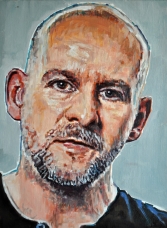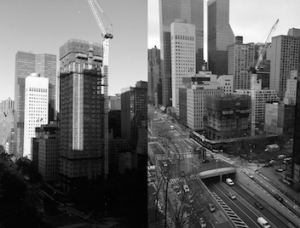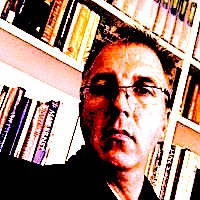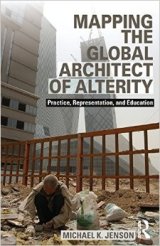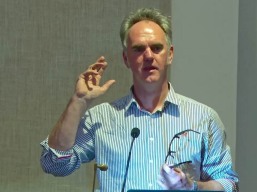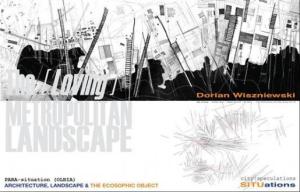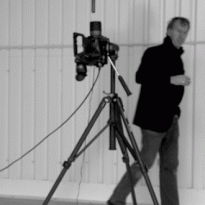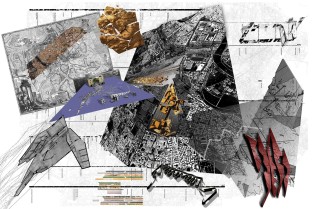Monday 25th May 2015
Venue: Minto House: LR1, ESALA, 20-22 Chambers Street
12:00-13:00 Sign-in / Registration
13:00-13:15 Opening Remarks: Dorian Wiszniewski, PhD
13:15-14:45 Session 1: Space of Communicatively
Doreen Massey’s Spaces of Multiplicity _Richard Bower, PhD, Plymouth University [UK]
Alterity and the Ideal: Within and Beyond Form in Art and Architecture_Brian Gassom, PhD, Gray School of Art, Robert Gordon University [UK]
What is Educational Space?_Emile Bojesen, PhD, University of Winchester [UK]
14:45-15:00 Coffee Break
15:00-16:30 AoA Research Workshop I
The Time of Light: Utopian Photo-conceptualism in the Work of Gordon Matta-Clark_Anthony Abiragi, PhD, University of Colorado [USA]
Performative Architectures: How to Sing in Public_Helen Statford, University of Sheffield [UK]
The Piratical Stance: the possibility for a piratical stance_Valeria Federighi, Politecnico Torino, Italy [EU]
16:45-17:30 Session 2: Conceptualizing Counter-Hegemonic Sites, Practices & Narratives
Utopia as Method: The Unlikely Prospect of a Counter-Hegemonic Architecture_Nathaniel Coleman, PhD, University of Newcastle, [UK]
Beyond Dualism: non-instrumental architecture_Malcolm Miles, PhD, Plymouth University [UK]
Urbanism of Alterity: a topological analysis_Luz Navarro-Eslava, WSA, Cardiff University [UK]
18:00-19:30 AoA Casual Prix Fixe Dinner, £20, plus a small booking [optional]
19:30-21:00 Keynote_Simon Critchley: Memory Theatre
Special Venue: Scottish Storytelling Centre, The Netherbow Theatre
Tuesday 26th May 2015
Venue: Minto House: LR1, ESALA, 20-22 Chambers Street
9:00-10:00 Keynote_Dorian Wiszniewski: Architecture: Alterity of An Ethics of Visuality
10:15-11:50 Session 3: Unveiling the Political: Process, Identity and Alterity
ALT-Spaces: On Textures of Spatial Alterity_Thomas Mical, PhD, University of South Australia [AU]
Socio-spatial Identity and Conflict in Contemporary Brussels_Katherine Prater, University of Cambridge [UK]
Hedonistic Urbanism as the Alterity of Postwar Beirut_Liz Martin-Malikian, University of Edinburgh [UK]
Bodies and the Ethno[flow]: Transnational Migrations of commodified flesh_Armando Montilla, Universitat Autonoma de Barcelona [EU]
12:00-13:00 Lunch Break 13:15-15:00
AoA Research Workshop II
Self-organized Architecture and the Superhistorical City_Clara Archibugi and Clemens Nocker, Sapienza University of Rome [EU]
Folkcodes and the Urban Legendary: Michael Sorkin, the Congress for New Urbanism and American Alterity in the 1990s_Andrew Santa Lucia, The School of the Art Institute of Chicago [USA]
Exploring Habitability: Skateboarding As ‘Rogue Architecture’_Tiphaine Kazi-Tani, Research Associate, CoDesign Lab, Telecom ParisTech [France]
Beyond Building Objects: Social Transformative Potential of Hybrid Architectural Intervention_Xiang Ren, University of Sheffield [UK]
15:30-17:00 Keynote_Michael Jenson: Mapping the Global Architecture of Alterity
Special Venue: Anatomical Lecture Theatre, Door 3 Medical School, Teviot Pl
17:30-19:00 Session 4: Global Architect of Alterity
Back-to-Session/Research Worskhop Venue: Minto House: LR1
Finding Self in the Other: Japanese-ness in western architecture_by Bob Brown, Plymouth University [UK]
“We don’t want a multi-cultural minaret, we want an Islamic minaret”, negotiating the past in the production of contemporary Muslim architecture in Britain_by Shahed Salem, RIBA, University of Westminster [UK]
Aldo Rossi’s Analogical City: Multitude and the Soul of the City_Cameron McEwan, PhD, University of Dundee [UK]
dinner on your own
Wednesday 27th May 2015
Venue: Minto House: LR1, ESALA, 20-22 Chamber Street
9:00-10:45 AoA Research Workshop 3
Shared Architecture, Social Practice and Intergroup-mixing on Belfast_Clare Mullholland, Queen’s University Belfast [UK]
Chinese Formal and Informal Urbanism: Socio-Spatial Practices of Alterity in Urban Villages_Litao Zhou and Dr. Tatjana Schneider, University of Sheffield, [UK]
The Small Public: Sites, Subjectivities and Scales of Alterity_Sze Y. Goh, Goldsmiths, University of London [UK]
Ephemeral Urban Cultures: the night markets of Taiwan_Justin Chung, Plymouth University [UK]
11:00-12:30 Session 5: Conceptualizing Counter-Hegemonic Sites, Practices & Narratives
Azadi Square: Deciphering ecological systems / frameworks + sites of morphing_Sundas Shadid and Javaria Shadid, Illinois Institute of Technology [USA]
Remediating the social through protest architecture: tAIt and St Peter’s square in Rome_Fabrizio Gesuelli, University of Edinburgh [UK]
The Self-othering event of object qualities and architecture as a mutable interface._Trevor Patt, Ecole Polytech Lausanne, Paris [EU]
12:30-13:00 Coffee Break
13:00-14:00 Closing Lecture: Mark Dorrian_What’s Interesting?
14:10-14:30 Closing Remarks
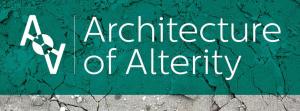
 rity@gmail.com
rity@gmail.com